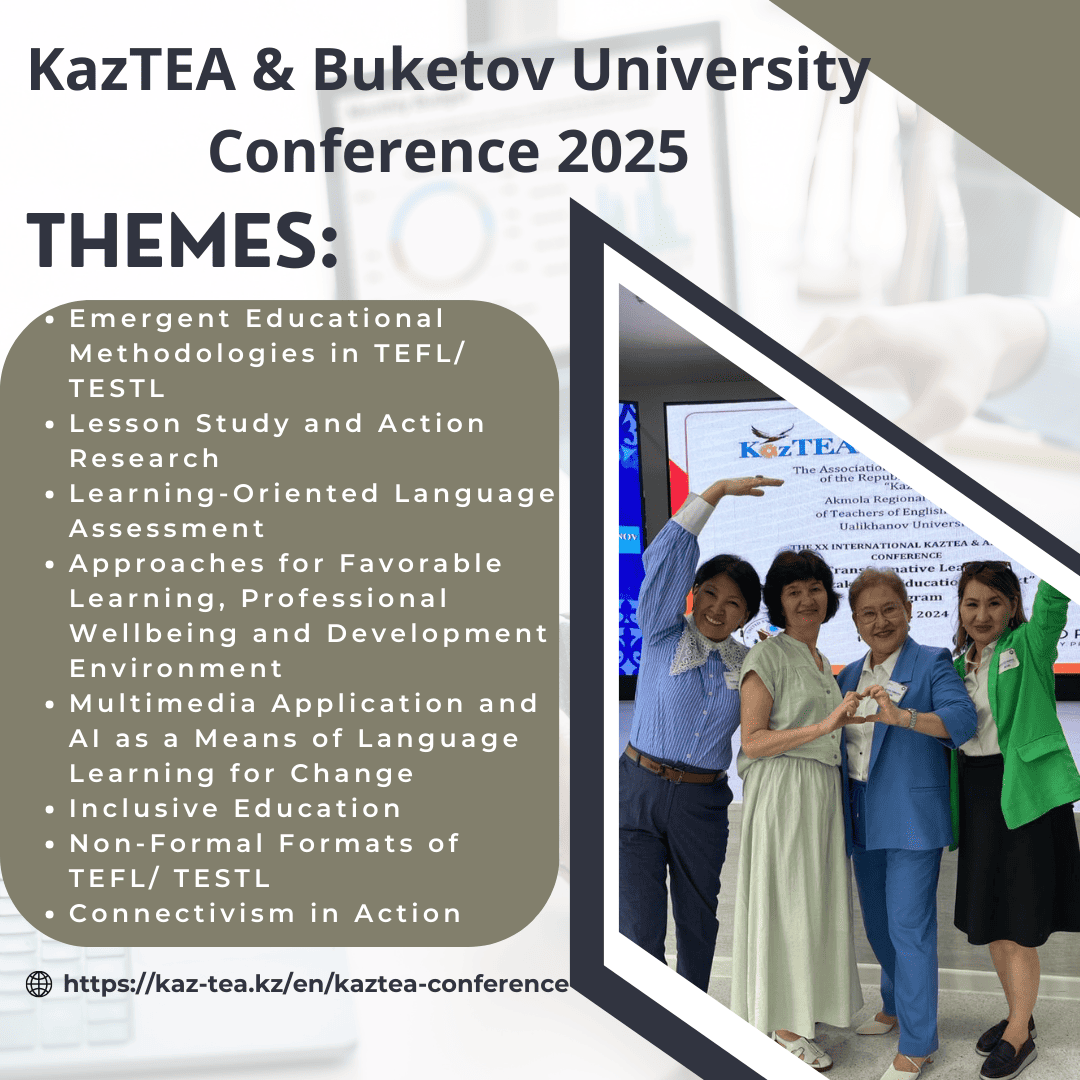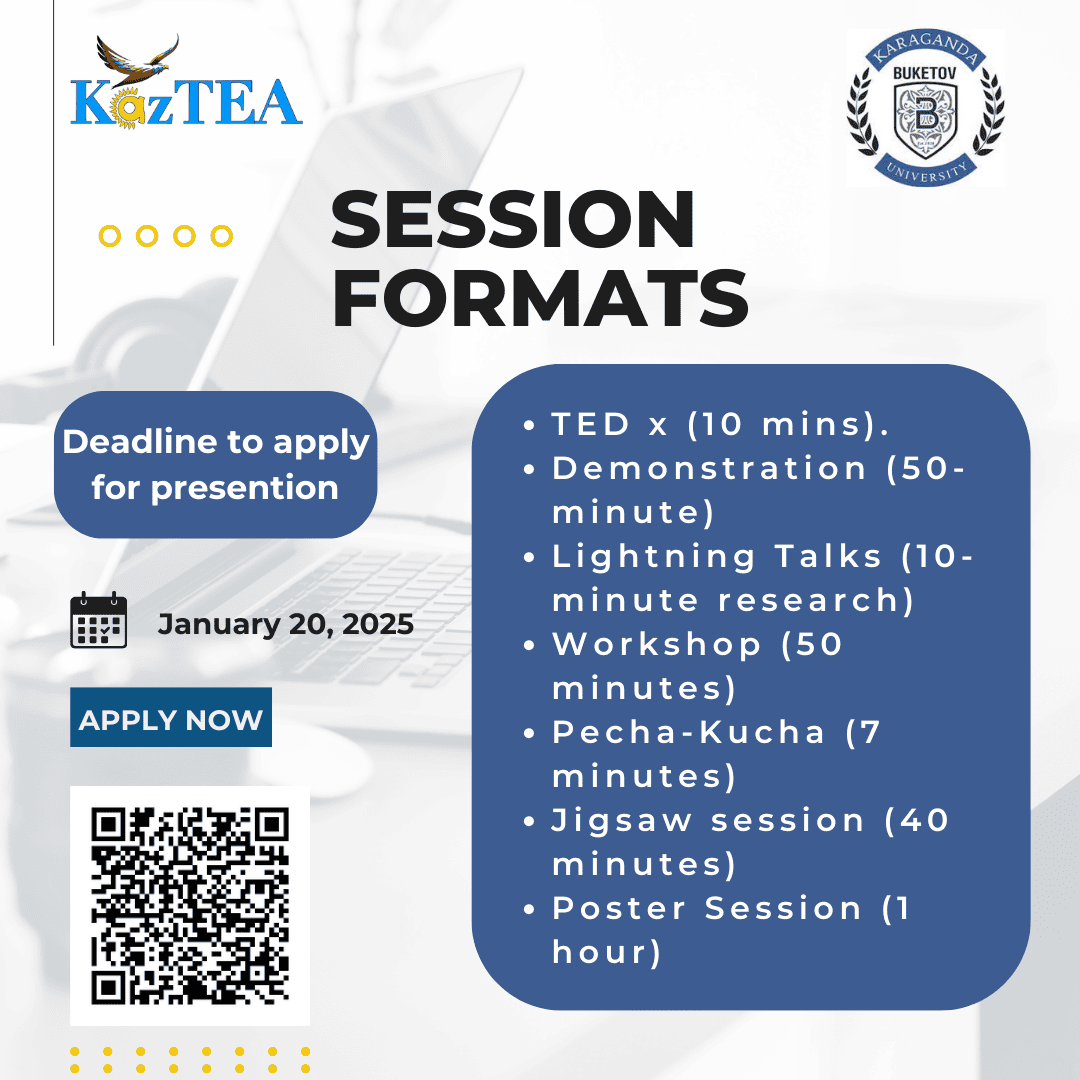The conference goal: improve the quality of education in the era of digitalization
via implementing blended teaching, application of artificial intelligence in the educational process in light of the connectivist approach and informal learning within the framework of the national project "Quality Education "Educated Nation".
Venue: Buketov University, Karaganda
Dates: April 10 - 11, 2025
Online conference: April 19, 2025
The conference “SMART and Non-Formal Foreign Language Education: Teaching to Learn, Learning to Teach” offers a wide range of engaging professional development opportunities to English language and STEM teachers at all levels and forms of educational institutions from Kazakhstan and other countries. At lively interactive sessions, you'll develop a global perspective through the exchange of ideas, research, and practices in the following trends:

The format: off- and online
The types of presentations:
TED x (10 mins). Live TED-like talks and performances are shared with the EFL teachers community. If you have an idea worth sharing and ignite lively discussion on the topics related to the conference theme, then this format is good for you.
Demonstration (50-minute practical-oriented presentation): Shows, rather than tells, a technique for teaching or testing. The presenter should spend no more than 5 minutes explaining the theory underlying the technique. Handouts are expected and audiovisual aids are encouraged.
Lightning Talks (10-minute research-oriented presentation): An oral summary, with occasional reference to notes or a text that discusses the presenters‟ work in relation to theory and/or practice. Handouts are expected and presentations are encouraged.
Workshop (50 minutes): A carefully structured, hands-on professional development activity. The leader helps participants solve a problem or develop a specific teaching or research technique. Handouts are expected and audiovisual aids are encouraged.
Pecha-Kucha (7 minutes): Speakers present up to 20 images discussing each for 20 seconds bringing the whole talk to just under 7 minutes. Images are required to slide automatically with speakers delivering only the relevant points on the topic in synchronization with the images.
Jigsaw session (80 minutes): Moderator arranges a discussion on a theme related to the association mission and strategies within a small group. All the participants assigned to the same theme form temporary “expert groups” and are given time to discuss their aspect and rehearse the presentations they will make to their jigsaw groups. Once back in their jigsaw groups, each member presents their segment to the others and asks for opinion and modifications. The moderator can float from group to group to ensure the discussion and solution is being delivered correctly. At the end of the session, each “expert” goes back to their initial group and report about any modifications done to their initial decision. Final presentation with all the modifications embedded is presented to all participants.
Poster Session (1 hour): The poster session is a self-explanatory exhibit that allows for informal discussion with participants. Exhibits are set up during the hour before the session and dismantled in the hour afterward. The poster should include a title, the name and institutional affiliation of the presenter(s), and a brief text with clearly labeled photos, drawings, graphs, or charts. Presenters are available for discussion. Detailed guidelines will be sent to accepted poster session presenters. First time attendees and graduate students are especially encouraged to apply for the poster session, which could serve as an important and interactive forum for sharing your work and receiving feedback. Handouts are expected.
Online presentation (20 mins): We understand that some presenters will be unable to make the trip to Kokshetau to present their proposal, mainly due to financial and/or academic commitments. KazTEA 2024 has therefore instituted Zoom sessions to allow the authors of accepted proposals the same publication opportunities as regular presenters.
Registration fee for the conference participation - 3 000 KZT
Registration fee for online conference - 2 000 KZT
Important dates:
20 January - Deadline to submit a proposal (LINK to submit your proposal)
5 February - Decision on the proposal
28 February - Submit an abstract / paper HERE
Requirements to the abstract:
Introduction – 40-50 words
Methods - 40-50 words
Discussion - 100 words
Results - 40-50 words
The guidance for a paper is HERE p. 7
Abstract publishing is free
Paper publishing fee - 5 000 KZT (after editorial board approval )
Link to submit a PAPER
Looking forward to reading your proposals and abstracts!





